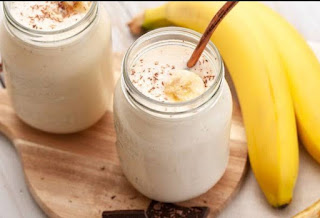Why You Shouldn't Put a Banana in Your Smoothies, According to New Research
TOPICS: NutritionPopularFoodScienceDietUC Davis
AUGUST 25, 2023 by UNIVERSITY OF CALIFORNIA - DAVIS
Polyphenol oxidase (PPO), an enzyme found in some fruits like bananas, has been discovered to limit the absorption of heart-healthy flavanols, particularly when coupled with flavanol-rich foods like berries. To maximize flavanol absorption, the study advises using ingredients with low PPO activity in smoothies, such as pineapple or oranges.
Maximizing the health advantages of fruit smoothies is made easier by new study.
Smoothies are a tasty and convenient way to include healthy fruits and vegetables in your diet. But is a smoothie with blueberries and bananas the greatest combination? According to recent research from the University of California, Davis, the way some components are combined in smoothies may affect how much nutrients your body absorbs.
In the study, which was just released in the journal Food and Function of the Royal Society of Chemistry, smoothies were used to examine how different concentrations of polyphenol oxidase, an enzyme found in many fruits and vegetables, affected the amount of flavanols in food that were absorbed by the body. A class of bioactive substances called flavanols, which are naturally present in fruits and vegetables like apples, pears, blueberries, blackberries, grapes, and cocoa, are beneficial for your heart and cognitive health.
"We sought to understand, on a very practical level, how a common food and food preparation like a banana-based smoothie could affect the availability of flavanols to be absorbed after intake," explained the study's lead author, Javier Ottaviani, director of the Core Laboratory of Mars Edge, a division of Mars, Inc., and an adjunct researcher with the UC Davis Department of Nutrition.
A banana or an apple that has been peeled or cut will immediately turn brown. Polyphenol oxidase, or PPO, a naturally occurring enzyme in certain foods, is the cause of it. When the food containing that enzyme is chopped, bruised, or exposed to air, browning takes place. The question the researchers sought to answer was if ingesting freshly made smoothies made from various fruits high in PPO affected the quantity of flavanols the body could absorb.
berries versus bananas
Participants were given smoothies made with mixed berries, which naturally have low PPO activity, and smoothies made with bananas, which naturally have high PPO activity. As a control, participants also took a flavanol pill. To determine how much flavanol was present in the body following consumption of the smoothie samples and capsule, blood and urine samples were examined. When compared to those who drank the control, individuals who consumed the banana smoot oohie had 84% lower levels of flavanols in their bodies.
"We were really surprised to see how quickly adding a single banana decreased the level of flavanols in the smoothie and the levels of flavanol absorbed in the body," said Ottaviani. This demonstrates how meal preparation and combination can impact how well nutritional components in food are absorbed.
The Academy of Nutrition and Dietetics recommended consuming 400 to 600 mg of flavanols daily for cardiometabolic health in a dietary recommendation last year. According to Ottaviani, consumers attempting to ingest these flavanols can think about making smoothies with fruits like berries that are high in flavanols along with other components that have low PPO activity, such as yogurt, pineapple, oranges, or mango.
He added that bananas are still a fantastic fruit to eat or use in smoothies. It is advised not to blend bananas, or other fruits and vegetables with high PPO activity, like beet greens, in smoothies with flavanol-rich fruits like berries, grapes, and chocolate.
The results of this study may inspire more investigation into the impact of food preparation methods on flavanol content. For instance, according to Ottaviani, tea is a significant dietary source of flavanols, with varying amounts of flavanols being available for absorption depending on the preparation method.
According to Ottaviani, this topic merits additional investigation in the realm of polyphenols and bioactive chemicals in general.
Reference: "Impact of polyphenol oxidase on the bioavailability of flavan-3-ols in fruit smoothies: a controlled, single blinded, cross-over study" by Javier I. Ottaviani, Jodi L. Ensunsa, Reedmond Y. Fong, Jennifer Kimball, Valentina Medici, Gunter G. C. Kuhnle, Alan Crozier, Hagen Schroetera and Catherine Kwik-Uribe, 24 August 2023, Food & Function.
D3FO01599H, 10.1039
Researchers from the University of Reading, King Saud University, and Mars, Inc. as well as Jodi Ensunsa, Reedmond Fong, Jennifer Kimball, Alan Crozier, and the UC Davis Department of Internal Medicine all participated to the study.
Mars, Inc., which works with academics to examine the possible health advantages of cocoa flavanols, provided funding for the study through a research grant.


टिप्पणियाँ
एक टिप्पणी भेजें